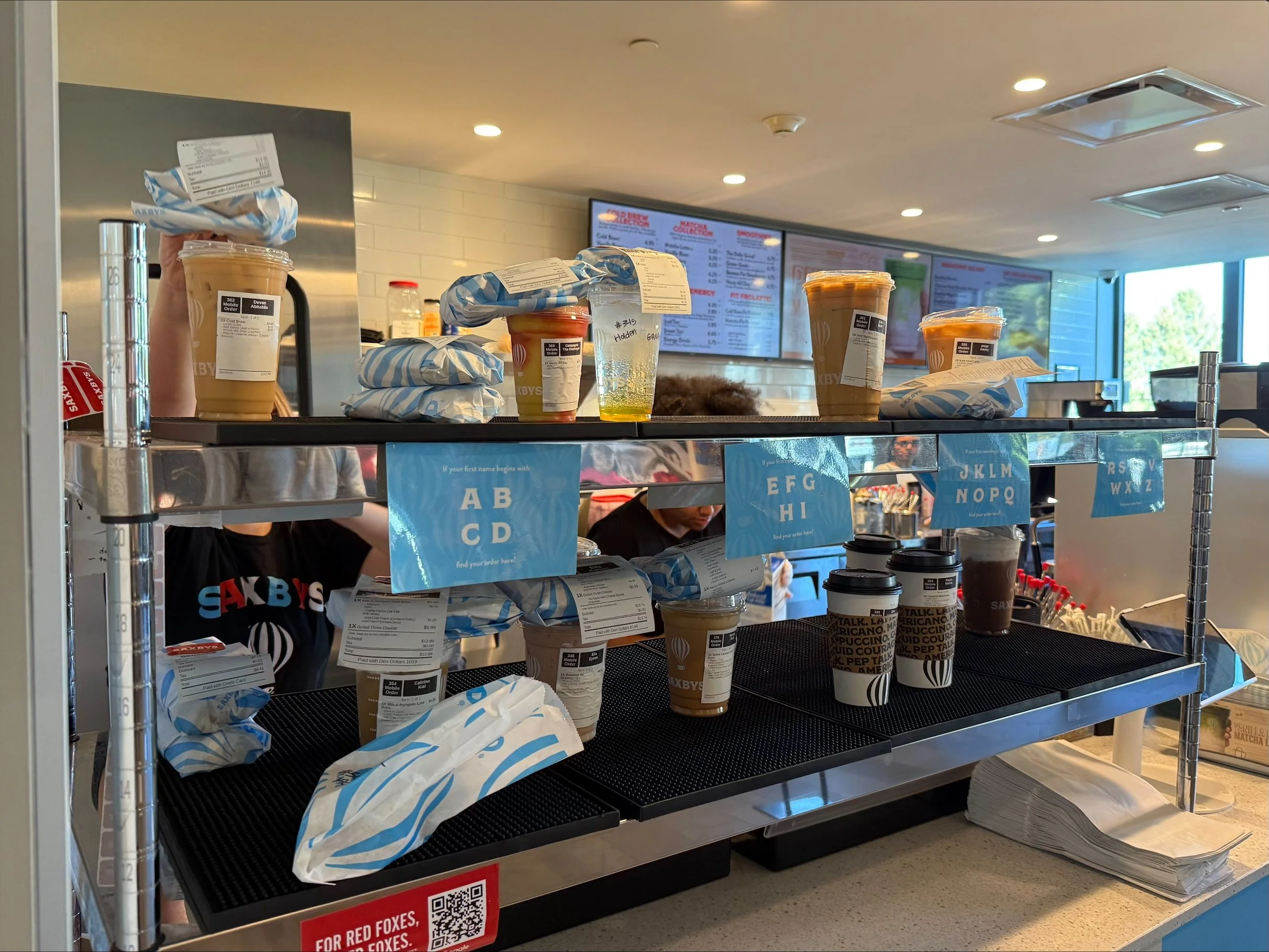Dining Services Works On Improving Reusable Cup Policy at Campus Cafes
Plastic drink containers stack up at Marist's Saxbys location during peak hours. Photo via Emma Stuber '26
Marist’s Sustainability Action Plan, which will be released this fall, outlines multiple ways that Marist University intends to improve and create further eco-friendly business practices.
A main issue, which has been frequently discussed by the Student Government Association (SGA) and Dining Services, is enhancing Marist's reusable cup policy for drinks at campus cafe locations.
Currently, students can bring a clean cup up to 24 ounces to cafes in buildings like McCann, Donnelly and Steel Plant to receive a discounted small hot or iced drip coffee, depending on location. However, a majority of drink options ordered on campus include more flavor additions, specialty or do not feature coffee at all.
Drinks are made in plastic containers, used by the customer within a short time period and then tossed. These disposable cups can be seen stacked up on multiple pickup counters and trash bins across campus, contributing heavily to the university’s total waste and costing a notable portion of the Dining Services budget.
Cafe chains like Starbucks have tackled the issue of single-use waste production by developing their own reusable cup policies. While placing a drink order either in-person or online, customers can indicate if they are bringing their own receptacle before the drink is made and receive a discount on the final item. However, Starbucks’s locations have a large retail kitchen area to ensure the cleanliness of received reusable cups, whereas smaller Marist cafes do not.
“The challenge we run into in many of those locations is that we don’t always have the physical structure,” explained Dining General Manager Michael Eggert. “It’s a lot easier at a Starbucks that has a traditional washing station for beverages. We don’t have that at the library, like at Books and Beans.”
Though there are setbacks, Eggert is passionate about making the policy work on campus. A part of the Conservation Sustainability Action Committee (CSAC) and previously the sub-committee chair of the food waste and water portion, he has worked with students and Marist organizations in the past to improve sustainable practices such as eco-friendly coffee sourcing and composting.
“Responsible food service is a core value of mine. I want to make sure that we use business as a force for good, not just for driving revenues and potential bottom line results,” he said.
Kristina Ortiz, director of retail dining, is also set on pursuing the policy.
“We’re working on a system where we can implement [a reusable cup policy] that doesn’t increase wait times for students or disrupt the flow of service that may cause someone’s drink to be missed or made twice,” she said.
In her position, Ortiz has worked on other single-use plastic limiting projects at Marist. Reducing plastic straws, including pursuing the purchase of drink lids that don’t require the use of a straw, is an initiative she is continually working on.
“Retail has a lot of room for growth, and a large part of this conversation revolves around our coffee program. So, we think about the amount of students who visit Saxbys, Books and Beans and Steel Plant and get lattes in plastic cups,” Ortiz said. “Retail is more challenging, specifically because each location is an island.”
Saxbys, a cafe on campus that is owned by an outside company, operates based on its own policies and standards that cannot be implemented by Retail Dining. Having a reusable cup policy at locations like these relies on a discussion with the cafe’s management, Ortiz explained.
Marist’s current takeout containers, used at locations like North End, are eco-products that can be recycled effectively from typically single-use plastics. Pickup locations have also altered practices to avoid automatically giving out takeout bags and cutlery, causing unnecessary waste.
Prior to COVID-19, the university had received an internal grant to purchase a reusable container system for takeout orders, according to Dr. Jessica Boscarino, associate professor of political science and member of CSAC. The plan was discarded once the pandemic hit, though she believes it is a system the college could return to considering.
Eggert and Ortiz encourage frequent input to improve dining practices on campus and understand what the student body is most concerned with. But they recognize that in order to install more sustainable policies, it is a cooperative effort that has to occur between students and dining.
“We can put out composting bins all we want, but students then need to know to be composting,” Ortiz said. “They need to not throw everything in one mainstream bin. It’s a hand-in-hand kind of initiative.”
“Keep us pushing,” Eggert said. “Please tell us what it is you want to see from an environmentally sustainable perspective that you think we can improve on, and collaborate with us. Don’t just tell us what’s wrong. Ideate with us and partner with us so we can talk through what’s feasible, what can work at Marist, and we will see what we can do to put it into action.”
